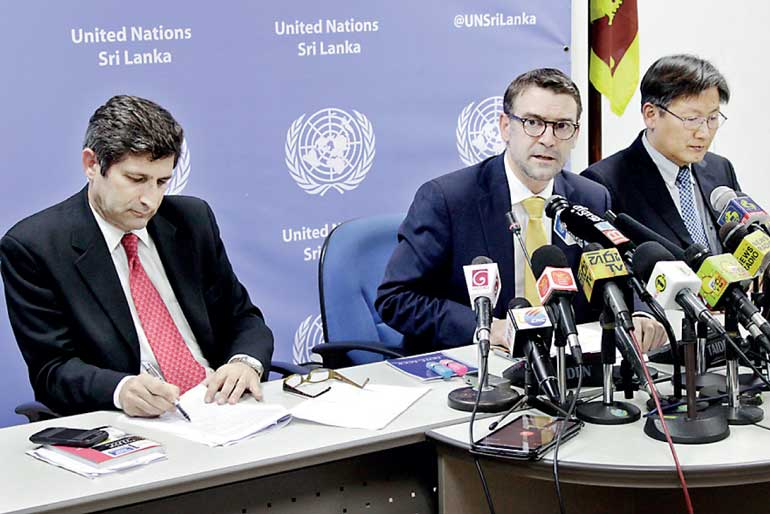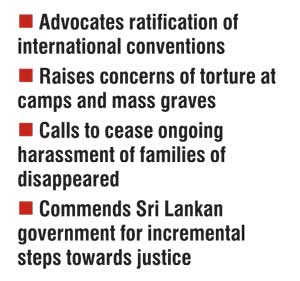Tuesday Feb 24, 2026
Tuesday Feb 24, 2026
Thursday, 19 November 2015 00:00 - - {{hitsCtrl.values.hits}}

United Nations Working Group on Enforced Disappearances Vice Chair Bernard Duhaime speaks as members Ariel Dulitzky and Tae-Ung Baik observe. - Pic by Shiran Illanperuma
 By Shiran Illanperuma
By Shiran Illanperuma
The UN Working Group on Enforced Disappearances (UNWGEID) on Wednesday called on the Sri Lankan government to implement sweeping legal reforms to end impunity and expedite investigations into over 23,000 cases of people who disappeared during the country’s 27-year war.
In their first visit in fifteen years, the UNWGEID led by Vice Chair Bernard Duhaime and experts Tae-Ung Baik and Ariel Dulitzky wrapped up a ten-day tour of the island on the invitation of the government. The monitoring tour included visits to detention cells and two mass graves where around 155 human remains have been exhumed – some showing signs of torture.
One cell was operated from within a Navy camp in the eastern part of the island and the experts said showed signs of being used even after the conflict ended. A comprehensive State policy to search for the disappeared while providing reparations for victims’ families was needed, they said. So too, were legal mechanisms to ensure these crimes could not be repeated.
From a legislative standpoint, the working group strongly recommended that Sri Lanka ratify the United Nations Convention for the Protection of all Persons from Enforced Disappearance. They also added that the Government should ratify related international treaties including protocols in the Geneva Convention and Rome Statute
Furthermore, Vice Chair Duhaime urged a separate judicial classification for enforced disappearances. “We consider it urgent that Sri Lanka introduce legislation to classify enforced disappearances as a different crime that recognises its continuous nature, prohibiting a statute of limitations or impunity”.
Remarking on the Presidential Commission to Investigate Into Complaints Regarding Missing Persons appointed in August 2013, UNWGEID urged the Government to finish its mandate, critiquing the lack of results in establishing the fate and whereabouts of disappeared persons.
“This commission does not have the trust and confidence of the victims,” said Dulitzky. “All the files collected should be transferred to the new proposed office of missing persons. The new institution should be victim centred and accessible to all,” he asserted.
While members of the working group declined to directly comment on the festering issue of political prisoners brought to light by recent hunger strikes, a complete repealing of the Prevention of Terrorism Act was also listed as a key policy reform necessary to prevent further enforced disappearances.
“The Prevention of Terrorism Act should be repealed because it contains several provisions that can create a climate in which enforced disappearances can occur. Particular the provisions which allow for detention without judicial supervision,” said Duhaime.
Despite a fledgling feeling of hope for families of the disappeared, the working group raised extreme concern over the ongoing culture of fear and intimidation plaguing those that take their grievances to court.
Said Dulitzky, “We received many, many allegations that CID personnel visit and harass the families of those who have disappeared and we strongly believe that is not permissible in a democratic society”.
Duhaime added, “Families have also been harassed because of their meeting with us. We believe that the highest authorities of Sri Lanka need to send a very strong message”.
“Enforced disappearances have been used in a massive and systematic way in Sri Lanka for decades to repress political dissent by state officials and affiliated paramilitary groups. These cases are followed by an almost complete lack of judicial accountability,” he said.
According to members of the working group, Sri Lanka has over the years launched at least 11 commissions for missing persons, most of which have come under fire for producing little to no concrete answers on the whereabouts of disappeared people.
However, the working group commended the new Government for setting a fast course for cases registered with them and highlighted the “historic opportunity” for adoption of profound measures to tackle enforced disappearance and ensure reparations of victims.
“We are encouraged by positions adopted by state of Sri Lanka in recent months. These are good positive steps but more needs to be done. There have been a lot of promises. But the time for promises is over,” he said.
Said UNWGEID Member Tae-Ung Baik, “We have seen and perceived a sense of enormous hope in Sri Lanka. We believe that this could be a real opportunity for lasting change and reparation. We encourage the government to provide and propose a comprehensive public policy to deal with enforced disappearances”.
By Chamodi Gunawardana
Foreign Affairs Minister Mangala Samaraweera yesterday stressed the Government would take action against relevant parties who harassed the relatives of disappeared people.
The United Nations Group of Enforced Disappearances, which made an official visit to Sri Lanka recently, has claimed the relatives of missing persons had faced a number of harassments from unknown parties.
Samaraweera said the Government would conduct an investigation regarding the UN allegations and take the necessary actions.
He added the Government would consider the UN recommendations regarding missing persons to ensure the protection of Sri Lankans.
“I had a meeting with the UN group and they called for the establishment of a permanent office to handle reports of missing persons in Sri Lanka. We expect to implement it as soon as possible,” Samaraweera noted.